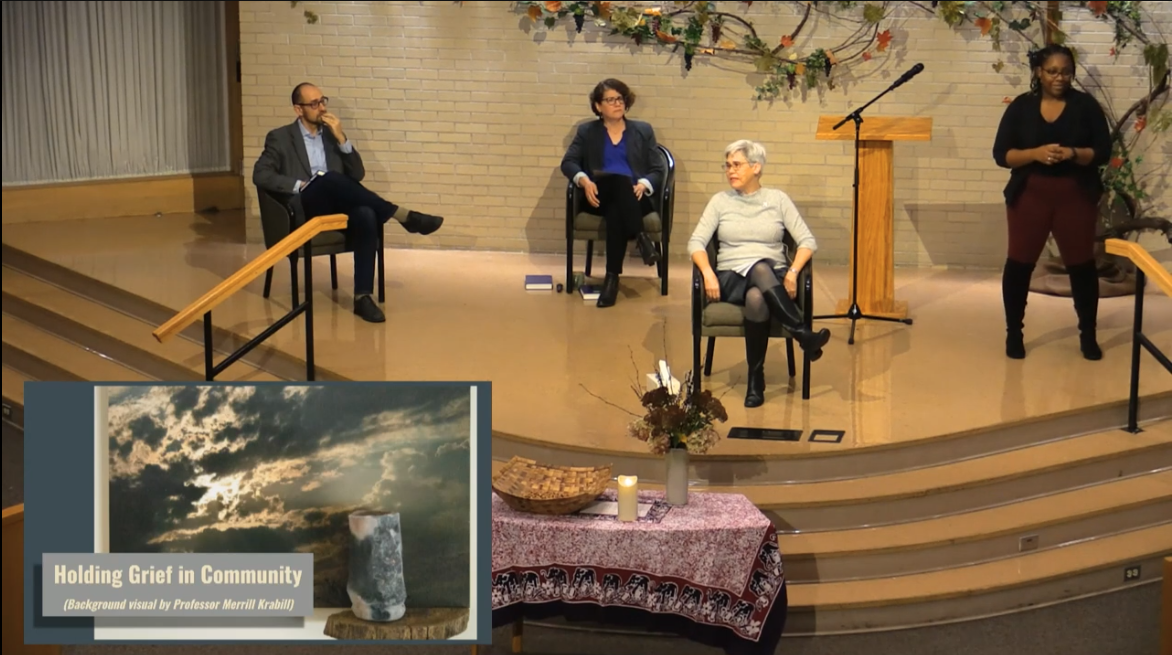Holding grief in community

This blog is adapted from comments I made in the special convocation on campus, “Holding Grief in Community,” on Oct. 26, 2022. You can view the video of that convocation here.
Our campus and our broader community have been dealing with an unusual amount of grief this fall.
Change and loss are part of being human, and grief is a familiar companion in the seasons of life. Still, I have a tendency to think that negative or uncomfortable emotions are “bad.” Or that something is wrong with me if I am sad, or angry, or melancholy. But no emotion is “bad.” Emotions just are.
A teacher of mine quoted her grandmother as saying, “Where is it written that you are supposed to be happy all of the time?”
One phase of grief is a kind of numbness or inability to function. Life just hurts too much. It makes me want to binge watch Netflix. And that’s okay, in doses. But I will usually feel happier if I get myself away from the screen or device. Good choices for me are walking, cooking, journaling, listening to upbeat music or playing pickleball. What are your good choices?
And it helps to tell someone. I might say, “I’m in a downward spiral. Help me figure out what to do next.” Which is not to say, “Solve my grief.” But telling my husband, Kevin, or my sisters that I need help — just saying it out loud — is help itself. It shifts me.
I understand well the urge to be discreet, and the desire to look composed. But it’s okay to cry, or to do whatever you need to do. Grief can feel scary, but you are not going crazy. If we ride the waves of grief and allow it into our lives, we may find that we are not swept away, as we fear, but that we slowly sense light and peace.
Thank goodness that when I’m sad, I can walk around campus and see students and colleagues laughing, talking and being happy. Seeing their enjoyment lifts me up. And I know that at other moments, I’m the smiling one, providing encouragement to others.
We really are connected. Scientific research is revealing that social connection is the strongest predictor of human happiness.
Grief is complicated. Sometimes when friends ask me how I am, I say, honestly, I am many things right now.
Some years ago, I was going through a long period of grief. And in that process I learned that I could be grieving and funny. I could be sad and learning. I could still laugh. And having fun, and learning and laughing and playing alongside our grief is not disloyal to our loss. It is being wholly human.
The path of grief is loopy, which might make us feel like we’re not getting anywhere. It’s useful to think of grief not as a line, but as a spiral. Grief takes time. But as we move through it, we can also learn and grow.
If that seems unbelievable to you right now, that’s okay. You don’t have to believe it. But people who study grief and loss say that, in time, we may:
- Have a greater appreciation of the small things in life
- Redefine what we consider “important”
- Become more focused on the relationships that truly matter
- Sense or discover our inner strength
- Grow deeper faith and spiritual understanding.
- Become more able to give and receive kindness
This pattern of growth through loss is what nature teaches us season upon season. The earth, her cycles, her gravity, her firm foundation beneath us is a teacher. And as I said in my opening convo, the soil is good here.
Rebecca Stoltzfus




